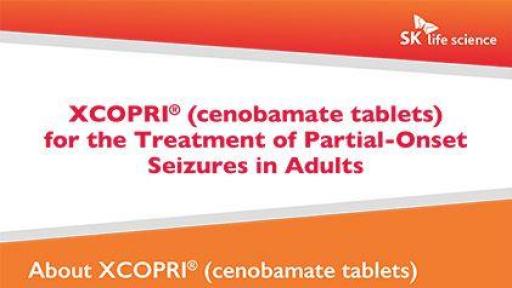Results of a Randomized Study of the Safety and Efficacy of Cenobamate in Adults with Uncontrolled Focal Seizures Published in The Lancet Neurology

PARAMUS, N.J., Nov. 13, 2019 /PRNewswire/ -- SK Life Science, Inc., a subsidiary of SK Biopharmaceuticals Co., Ltd., an innovative global pharmaceutical company focused on developing treatments for central nervous system (CNS) disorders, announced The Lancet Neurology has published results from a multicenter, double-blind, randomized, placebo-controlled, dose-response study of the safety and efficacy of cenobamate, an investigational anti-epileptic drug (AED), in adults with uncontrolled focal (partial-onset) seizures. The results of the study demonstrated that adjunctive treatment with cenobamate produced significant reductions in seizures compared to placebo.
Eligible patients taking 1-3 AEDs were randomized to once daily placebo or cenobamate 100 mg, 200 mg or 400 mg and treated for 18 weeks (6-week titration phase followed by a 12-week maintenance phase at the target dose). Key study findings included statistically significant greater median percent reductions in focal seizure frequency over the entire treatment period compared to baseline for the cenobamate 100 mg, 200 mg and 400 mg groups (36%, 55% and 55%, respectively) compared to the placebo group (24%). Additionally, a statistically significant greater percentage of patients achieved a 50% or greater reduction in focal seizures during the maintenance phase compared to baseline for the cenobamate 100 mg, 200 mg and 400 mg groups (40%, 56% and 64%, respectively) compared to the placebo group (25%). Furthermore, during the maintenance phase, 4%, 11% and 21% of patients treated with cenobamate 100 mg, 200 mg and 400 mg, respectively, reported no focal seizures compared with only 1% of placebo-treated patients.
"This is the first publication showing the results of a randomized, controlled clinical trial of cenobamate in adults with uncontrolled focal seizures," said Gregory L. Krauss, MD, professor of neurology at Johns Hopkins University and lead author of the study. "The results demonstrated significant dose-related reductions in seizure frequency with cenobamate during the maintenance phase compared to placebo. Encouragingly, a high number of patients had zero seizures during the maintenance phase in the 200 mg and 400 mg groups."
"More than one-third of patients with epilepsy have uncontrolled seizures and treatment outcomes for these patients have not substantially improved over the past 20 years,"i said Marc Kamin, MD, chief medical officer, SK life science. "Based on the results in the maintenance phase of the study, a post-hoc analysis of the number of patients needed to treat to get someone to zero focal seizures was 10 for the 200 mg dose and five for the 400 mg dose. We are encouraged by these results as they suggest that cenobamate may be able to help patients with focal seizures who have not yet achieved adequate seizure control."
Overall, most treatment-emergent adverse events (TEAEs) were mild or moderate in severity, and similar to those observed with other AEDs. The most common TEAEs reported were somnolence (sleepiness), dizziness, headache, fatigue and diplopia (double vision), and the incidences increased with the dosage. One serious case of drug reaction with eosinophilia and systemic symptoms (DRESS) occurred in the 200 mg cenobamate group.
About Study 017
Study 017 is a multicenter, double-blind, randomized, placebo-controlled, dose-response study to evaluate the safety and efficacy of cenobamate as an adjunctive therapy in adults (18 to 70 years old) with uncontrolled focal epilepsy despite treatment with 1-3 anti-epileptic drugs (AEDs).
Following an 8-week baseline period, the study participants were randomized to one of three doses of cenobamate (100 mg, 200 mg and 400 mg once daily) or placebo for 18 weeks (6-week titration phase and 12-week maintenance phase). The primary outcomes were median percentage seizure reduction over the entire study and 50% responder rate (percentage of patients achieving ≥ 50% reduction in seizures) during the maintenance phase. Patients who continued to meet study eligibility had the option to enroll in an open-label extension, the results of which will be presented at upcoming medical meetings and will provide additional insight into the long-term clinical and safety profile of adjunctive cenobamate.
About Cenobamate
Cenobamate (YKP3089) was discovered by SK Biopharmaceuticals and SK life science and is being investigated for the potential treatment of partial-onset seizures in adult patients.
Cenobamate is believed to reduce repetitive neuronal firing by inhibiting voltage-gated sodium currents and as a positive allosteric modulator of the GABAA ion channel.
Global trials for adults with partial-onset seizures are ongoing to evaluate cenobamate's long-term safety, and additional clinical trials are investigating cenobamate in other seizure types.
The FDA accepted the filing of the New Drug Application for cenobamate for the potential treatment of partial-onset seizures in adults in February 2019. A Prescription Drug User Fee Act (PDUFA) target action date has been set for November 21, 2019. Cenobamate is not approved by the FDA or any other regulatory authorities. Safety and efficacy have not been established. (Article from : www.drugs.com)

